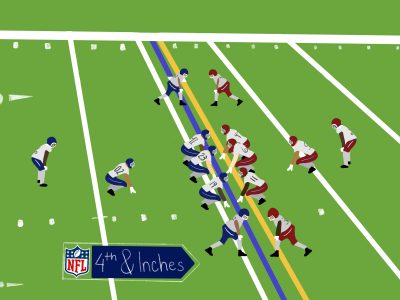This week, National Football League commissioner Roger Goodell is hosting the annual owner’s meeting, in which all 32 team owners come together to vote on proposed changes for the upcoming season.

While the owners vote on multiple issues, many fans, players and coaches are most concerned about the decisions that affect gameplay.
A few of the proposals include changes to the reviewal process, with a general focus on providing more opportunities for officials to make the correct in-game decisions.
Throughout the 2022-23 season, there was a significant amount of questionable calls that changed the trajectory of games. It seemed to be a weekly occurrence — a new fan base would take to social media to complain about a referee.
While fans are typically fueled by emotion and bias, many of these complaints were valid.
A few seasons ago, the NFL implemented new regulations regarding contact to the quarterback. Quarterbacks are usually in a defenseless position and can be easily injured by a blindside rush. The intent of the stricter rules was to decrease the risk of injury. However, it simply increased the frequency of penalties.
The NFL official rulebook states: “When in doubt about a roughness call … against the quarterback, the Referee should always call roughing the passer.”
The inherent flaws are obvious. If an official believes a pass rusher uses extra force, they will throw the flag without thinking twice. As a result, many players have been called for penalties that would otherwise be normal tackles.
This was apparent during the Oct. 9 matchup between the Buccaneers and the Falcons. Down by six with three minutes left, Falcons defensive tackle Grady Jarrett sacked Tom Brady to force a crucial fourth down. Jarrett executed a textbook sack, avoiding contact to the head and below the knees.
However, Jarrett was called for roughing the passer, essentially crushing any hopes of a comeback. Atlanta’s head coach Arthur Smith was livid, likely screaming every four-letter word in his vocabulary.
The officials were unable to review or overturn the call, and the new set of downs allowed Tampa Bay to ice the game.
If passed, one of the proposed rule changes would allow coaches the chance to challenge roughing the passer penalties. It would also subjugate roughing penalties to replay reviews, allowing officials to further examine the play.
Yet, recent reports have indicated that the proposal will unlikely reach the 3/4 majority vote it requires to pass.
This is not a good sign for the other rule changes on the docket. Based on the caution refs are trained to use when determining roughing the passer penalties, many unnecessary flags are thrown as a knee-jerk reaction to perceived aggression.
Many of the proposed rule changes aim to extend the jurisdiction of replay reviews and increase the amount of calls coaches can challenge.
If the majority of owners are unwilling to adopt a change that combats the inaccuracy of a penalty often called out of caution, it’s unlikely they approve similar proposals regarding replay reviews.
This is absurd.
One of the most controversial penalties is pass interference. While there are general guidelines on when a player performs this violation, every referee has a slightly different interpretation of the rule. Some refs let the players be more physical downfield while others throw the flag at any sight of contact.
Based on how the referees are positioned on the field, it’s likely only one official gets a somewhat clear view of the play. Yet, the penalty is not eligible to challenge or review. Even worse, the penalty is a spot foul, meaning if it occurs downfield on a deep pass, it can completely flip the field.
Fans have seen miscalls change the outcome of a team’s season. The infamous no-call from the 2019 playoff game between the Rams and Saints is one of the most egregious examples of faulty officiating in the history of the league.
If the coach was allowed to challenge the call, or if the officials were able to review it, the game likely would have had a different outcome. It may have even cost the Saints a trip to the Super Bowl.
Officiating over the past few seasons has been awful, and the refs are not the only ones at fault. Sure, some refs may choose pride and uphold their initial call rather than assessing the correct ruling, but to prevent the opportunity to review a significant call is unacceptable.
One argument against adding more replay reviews is that it slows down a game. However, every time an official throws a flag, the game already slows down. Why not take the extra time to ensure that the call is correct?
While it remains unlikely that changes to the roughing the passer penalty get approved, hopefully, the owners adopt some of the other proposals to give coaches and officials more authority over what can be reviewed.
After all, replay review is in place to ensure that calls made on the field are correct. It upholds the integrity of the game. As major decision-makers in the league, NFL owners need to make the right decisions to ensure that integrity is maintained.




















































































































